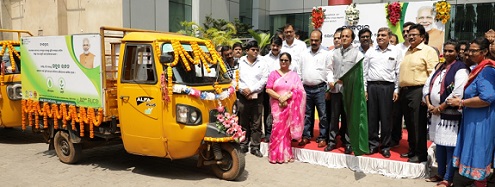By Our Correspondent
BHUBANESWAR/NEW DELHI: Marking 150th birth anniversary of Mahatma Gandhi , Oil Manufacturing Companies launch 1000 Van Movement in 100 cities across the country for creating mass awareness on Repurpose Used Cooking Oil (RUCO)
State Level Coordinator-Oil Industry, Odisha cum Chief General Manager,IndianOil, Subhajit Ghosh flagging off LPG delivery vehicles for spreading mass awareness on RUCO at IndianOil Bhavan Bhubaneswar to mark the initiative towards better health and cleaner environment. Bharat Petroleum (BPCL) and Hindustan Petroleum (HPCL) official flagging off LPG Delivery Vans at Puri and Cuttack.
“At present, approximately 850 crore litres of High Speed Diesel (HSD) is consumed on a monthly basis in India. The National Policy on Biofuels – 2018 envisages a target of 5% blending of Biodiesel in HSD by 2030.
In order to achieve the blending target, 500 crore litres of Biodiesel is required in a year. In India, approximately, 22.7 MMTPA (2700 crore litres) of Cooking Oil is used out of which 1.2 MMTPA (140 Crore) UCO can be collected from Bulk Consumers such as hotels, restaurants, canteens, etc. for conversion, which will give approximately 110 crore litres of Biodiesel in one year. Presently there is no established collection chain for UCO. Thus, there is a huge opportunity in production of biodiesel from UCO” Ghosh said.
To spread awareness about the ill-effects of reusing cooking oil, a mass awareness campaign on RUCO (Repurpose Used Cooking Oil) is being undertaken by the Oil Marketing Companies, under the aegis of Ministry of Petroleum & Natural Gas (MoP&NG). The event is being flagged off at New Delhi and 100 more cities today i.e. 2nd October 2019 to mark the 150th birth anniversary of Father of Nation, Mahatma Gandhi.
In each of the cities, LPG delivery vehicles are being deployed to spread awareness amongst consumers, households, and Food Business Operators (FBOs) to create a movement towards a healthier India.
The practice of reheating cooking oil or using the same cooking oil for frying is common. Cooking oil is often repeatedly used by topping it up with fresh oil. Generally, big food businesses involved in the manufacturing of fried foods dispose of their used cooking oil (UCO) for industrial purposes (soap manufacture, etc.) but sometimes it finds way to small food vendors at cheap prices.
At household level or by road-side vendors, the UCO is discarded in an environmentally hazardous manner blocking the sewerage and drainage systems. Therefore, in order to safeguard public health, FSSAI has notified the limit of Total Polar compounds (TPC) to be not more than 25% beyond which the oil is unsafe for human consumption. Higher level of TPC in cooking oil leads to health issues like hypertension, atherosclerosis, Alzheimer’s and liver diseases. One of the studies also noticed high levels of glucose, creatinine and cholesterol with declined levels of protein and albumin in re-used cooking oil.
As used cooking oil is considered the most reasonable feedstock for biodiesel production, it is planned to redirect the used cooking oil from the food business operators for production of Bio-diesel. The benefits of converting UCO to biodiesel are Health Benefits, Cleaner Environment, Reduce Import Dependency and Infrastructural Investment in Rural Areas
Biodiesel is a liquid bio-fuel obtained, from biological sources viz. plant origin and animal origin, by chemically processing from vegetable oils or animal fats and an alcohol that can be used in diesel engines, alone or blended with diesel oil. Biodiesel is made through a chemical process called trans-etherification whereby the glycerine is separated from the fat or vegetable oil. The process leaves behind two products – methyl esters (the chemical name for Biodiesel) and glycerine (a valuable by product usually sold to be used in soaps and other products).
Biodiesel can help combating issue of used cooking oil: Biodiesel is an environment friendly option that can be help in solving the issue of food waste especially used cooking oil. If produced domestically with natural resources, its use decreases our dependence on imported fuel and contributes to our own economy. Biodiesel opens a great entrepreneurship opportunity and employment in the country.
Prime Minister Narendra Modi has said that “social entrepreneurs can benefit from Swachh Bharat programme as it has huge business element, while stressing on the need to convert waste into wealth. He has said that waste to wealth is a belief that is gaining momentum. If we consider waste as waste, then we have lost our precious possession.” Government bodies, oil industry and biodiesel associations would collaborate to plan a strategy to collect used cooking oil and convert it into an environment friendly resource.
In New Delhi, Secretary, Petroleum and Natural Gas Dr M.M.Kutty flagged off the publicity vans in Delhi, to generate awareness among the people about the OMCs’ initiative of converting Used Cooking Oil to Biodiesel.
Wide publicity is being given to the RUCO (Repurpose Used Cooking Oil) initiative by the Oil Marketing Companies (OMCs) to make India “Swachh” by conversion of used cooking oil, which otherwise would be disposed off in drains, cause spillages/ environmental damage and pose health hazards. Chairman IOCL Shri Sanjiv Singh was also present on the occasion. Similar initiatives are being launched at various places in the country. The publicity involves wide social media campaign to spread awareness and educate people about the ill effects of used cooking oil and ways to dispose it off for converting it to biodiesel. The publicity vans will also carry the poster messages across 100 cities to spread the awareness. This awareness initiative of the OMCs would be a continuous process in coming days.
Oil Marketing Companies (IOC, BPC & HPC), under the aegis of Ministry of Petroleum & Natural Gas, have floated Expression of Interest (EOI) across 100 cities of India for supply of Bio-diesel produced from Used Cooking Oil (UCO). The EOI was floated on 10th August 2019 on the occasion of World Bio-fuel day. The EOI on Bio-Diesel from UCO provides that the entrepreneurs setting up Biodiesel plants get remunerative price and assurance of complete off take of production by the Oil companies.
The consumption of Used Cooking Oil (UCO) poses adverse health effects. During frying, several properties of cooking oil are altered and Total Polar Compounds (TPC) are formed on repeated frying. The toxicity of these compounds is associated with several diseases such as hypertension, atherosclerosis, Alzheimer’s disease, liver diseases. Therefore, it is essential to monitor the quality of vegetable oils during frying. Also disposal of UCO in drains causes ecological damage and is an environment concern.
In order to safeguard consumer health, Food Safety and Standards Authority of India (FSSAI) has fixed a limit for Total Polar Compounds at 25 percent beyond which the vegetable oil shall not be used for cooking. Repurpose Used Cooking Oil (RUCO), launched by FSSAI, provides an ecosystem that will enable the collection and conversion of UCO to biodiesel.
Consumers can give their Used Cooking Oil to authorised aggregators of Used Cooking Oil who will in turn give it to the Biodiesel Manufactures for production of Biodiesel which will be used for blending with Diesel.






















